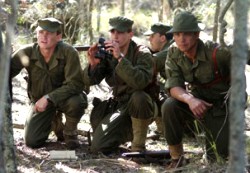Jeff reviews:
The Great Raid
Aug. 22, 2005
2005, 2 hr 10 min., Rated R for strong war violence and brief language. Dir: John Dahl. Cast: Benjamin Bratt (Lt. Colonel Mucci), James Franco (Captain Prince), Joseph Fiennes (Major Gibson), Marton Csokas (Captain Redding), Connie Nielsen (Margaret Utinsky).
Considering my movie reviews lately have been about movies that have no inkling of dramatic scope, �one of these movies is not like the others.� Indeed. The Great Raid is not summer blockbuster popcorn fare. But just because it�s more serious and worthy of praise doesn�t mean it�s not what you�re looking for in Saturday night entertainment.
It is, however, the kind of movie that stirs the juices and becomes an important tale of humanity since it�s doubtful you�ve heard of the greatest raid to save POWs in America�s history.
The Great Raid does and doesn�t follow the mold of prison camp dramas like The Great Escape and Bridge on the River Kwai. It�s more like the latter than the former, which is the ultimate in breakout films � awesome cast, impressive story based in fact � of course it had plenty of comedy, too.
Raid is joyless. The entire cast is incredibly serious, always talking low and full of reflection. In part that�s what doesn�t work; there�s a lack of camaraderie among soldiers, and it doesn�t get those jingoistic �rah rah� emotions going.
|
 |
|
The unit's patented "duck call" technique was proven to deter fowl-fearing Japanese troops in the area.
|
For the �based on a true story� plot, we hop in the Way Back Machine to the 1940s. In 1941 and early �42 the Philippines is raided by the Japanese as they take over all of the Pacific Rim. American and Philippino soldiers had no chance of backup at the time, and 70,000 were taken hostage. 15,000 would subsequently die in what became known as the Bataan Death March across the country to several prison camps, where thousands more died from abuse, disease and starvation.
A few years later, The Great Raid tells of the rescue of 511 of the POWs from one camp over five days in January, 1945 as the Americans retook the Philippines and saved as many prisoners as possible from being killed as the Japanese retreated.
What is very important about this film is that it doesn�t pull any punches and try any PC hogwash. If you think the terrorists being held in Cuba are mistreated, though none have died and all who leave are in better health than when they came, then you can�t comprehend what the word torture really means.
Back then, Japan was a diseased culture needing to be taken down a notch. Their soldiers didn�t care about any Geneva Convention and considered it dishonorable that any enemy soldiers let themselves be captured. When they got tired of holding POWs, the Japanese would string them up, burn them to death or just shoot them in front of big pits. Tens of millions died in Asia, especially China, and our soldiers could expect no safe quarter as prisoners. It�s safe to say the Japanese weren't reading "Harry Potter" to our soldiers in captivity.
Jumping back and forth in a fashion the viewer can easily grasp and even desire for a change of pace, The Great Raid is told in three parts, the rescuers, the prisoners and the underground rebels.
James Franco, Peter Parker�s foul friend in Spider-Man, organizes the raid with just 120 troops in hostile terrain where just one wrong move could cost the entire operation. As a result, expect a lot of talk from Franco and his superior officer, Benjamin Bratt, about rescuing the troops, �or die trying.� Also, �Nothing in our lives will ever be as important as this.� Those are common clich�s like never, ever talk about the future in war movies, but it�s hard to miss making a decent war movie because such dialogue and commitment never gets old.
In Japanese-controlled Manila, Connie Nielsen stayed around as a nurse and a member of the Philippino underground, largely to help smuggle supplies to her dreamboat Joseph Feinnes, a POW in the camp the movie is about.
In the Cabanatuan camp, Feinnes is having the worst time of everyone. It�s not that he has to bury his fellow soldiers who were murdered by the Japanese version of the SS, or the starvation, or the malaria, when he has to battle being lovesick for Nielsen.
Since we already know the end, that the raid was successful and we won the war, I thank the filmmakers for how they show the climax. The movie follows Franco�s plan. We know what's going on, there�s none of that confusing handheld camera shaking "chaos of battle" slow-motion that distracts the viewer from the action.
The Great Raid:  
BACK TO JEFF'S FILM REVIEWS
|